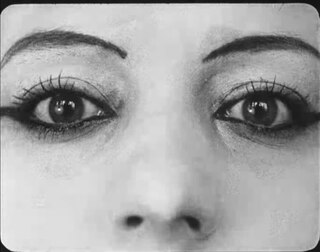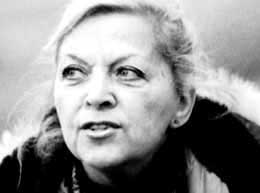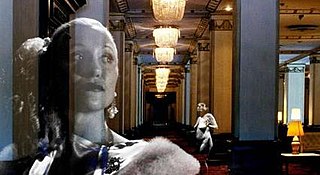Related Research Articles
An underground film is a film that is out of the mainstream either in its style, genre or financing.

Experimental film or avant-garde cinema is a mode of filmmaking that rigorously re-evaluates cinematic conventions and explores non-narrative forms or alternatives to traditional narratives or methods of working. Many experimental films, particularly early ones, relate to arts in other disciplines: painting, dance, literature and poetry, or arise from research and development of new technical resources.
James Fotopoulos is an independent filmmaker whose work is low-budget and rigorous, and consists of experimental narrative features, non-narrative shorts, and video installations. He began creating his film projects as a teenager in 1993, and as of 2012, has made over 100 films and videos.

Inauguration of the Pleasure Dome is a 38-minute avant-garde short film by Kenneth Anger. It was filmed in December 1953 and completed in 1954. Anger created two other versions of this film in 1966 and the late 1970s. According to him, the film takes the name "pleasure dome" from Samuel Taylor Coleridge's atmospheric 1816 poem Kubla Khan. Anger was inspired to make the film after attending a Halloween party called "Come as your Madness" hosted by artist Renate Druks. The film has gained cult film status.

Christabel is a long narrative ballad by Samuel Taylor Coleridge, in two parts. The first part was reputedly written in 1797, and the second in 1800. Coleridge planned three additional parts, but these were never completed. Coleridge prepared for the first two parts to be published in the 1800 edition of Lyrical Ballads, his collection of poems with William Wordsworth, but left it out on Wordsworth's advice. The exclusion of the poem, coupled with his inability to finish it, left Coleridge in doubt about his poetical power. It was published in a pamphlet in 1816, alongside Kubla Khan and The Pains of Sleep.
The Chicago Underground Film Festival (CUFF) is an annual nonprofit international festival dedicated to the exhibition of underground and avant-garde cinema, video, and performance.The festival offers an opportunity for independent artists who are frequently overlooked by other conventional, market-driven film festivals to showcase and be recognized for their work though jury and audience awards. In addition to screenings, the festival also hosts events to build community amoungst the audience. Founded in 1993, the festival is widely regarded as the longest running festival of its kind.

Gwendolyn Audrey Foster is an experimental filmmaker, artist and author. She is Willa Cather Professor Emerita in Film Studies. Her work has focused on gender, race, ecofeminism, queer sexuality, eco-theory, and class studies. From 1999 through the end of 2014, she was co-editor along with Wheeler Winston Dixon of the Quarterly Review of Film and Video. In 2016, she was named Willa Cather Endowed Professor of English at the University of Nebraska at Lincoln and took early retirement in 2020.

Moods of the Sea (1941) is a non-narrative experimental film by Slavko Vorkapich and John Hoffman, set to the music of Felix Mendelssohn known as the Hebrides Overture.

Warren Sonbert was an American experimental filmmaker whose work of nearly three decades began in New York in the mid-1960s, and continued in San Francisco throughout the second half of his life. Known for the exuberant imagery of films such as Carriage Trade and especially for their intricate and innovative editing, he has been described as "the supreme Romantic diarist of the cinema" as well as "both a probing and playful artist and a keen intellect reveling in the interplay between all the creative arts."
Christabel may refer to:
Su Friedrich is an American avant-garde film director, producer, writer, and cinematographer. She has been a leading figure in avant-garde filmmaking and a pivotal force in the establishment of Queer Cinema.

Facets Multi-Media founded in 1975, is a non-profit, 501(C)3 organization, and a media arts organization. Its mission is to preserve, present, distribute, and educate about film. Besides its facilities at 1517 W. Fullerton Ave., Chicago, Illinois, Facets Multi-Media also runs Facets Video, one of the largest distributors of foreign film in the United States. Facets has been described as a “temple of great cinema” by film critic Roger Ebert and "a giant in the rarefied world of art-house films and cultural education."

Storm de Hirsch (1912–2000) was an American poet and filmmaker. She was a key figure in the New York avant-garde film scene of the 1960s, and one of the founding members of the Film-Makers' Cooperative. Although often overlooked by historians, in recent years she has been recognized as a pioneer of underground cinema.
Philip Stewart Solomon was an American experimental filmmaker noted for his work with both film and video. In recent years, Solomon had earned acclaim for a series of films that incorporate machinima made using games from the Grand Theft Auto series. His films are often described as haunting and lyrical.

Chel White is an American film director, composer, screenwriter and visual effects artist. In his independent films and music videos, White is known for his stylized, often experimental use of images, unusual animation and narratives depicting an outsider's perspective. He often adopts darkly humorous and poetic sensibilities to explore topics of love, obsession and alienation; with dreams and the subconscious being his greatest influences. He describes his own work as “stories and images that reside on the brink of dreams, or linger on the periphery of distorted memories.” A Rockefeller Fellow, Chel White has made three films based on the work of Peabody Award-winning writer and radio personality Joe Frank.
Remedial Reading Comprehension is an experimental short film by Owen Land, produced in 1970.
The Film-Makers' Cooperative is an artist-run, non-profit organization founded in 1961 in New York City by Jonas Mekas, Andy Warhol, Shirley Clarke, Stan Brakhage, Jack Smith, Lionel Rogosin, Gregory Markopoulos, Lloyd Michael Williams, and other filmmakers, for the distribution, education, and exhibition of avant-garde films and alternative media.

Bill Brand is an experimental film and video artist, educator, activist and film preservationist.

The Decay of Fiction is a 2002 American 35mm part color and part black-and-white experimental film noir project directed by independent filmmaker and artist Pat O'Neill. The film, initially conceived as a documentary, was produced by O'Neill and Rebecca Hartzell for Lookout Mountain Films. Filming took place in Los Angeles.
References
- 1 2 Crawford, Travis (Spring 2001). "Interiors: Travis Crawford peers into the dark world of James Fotopoulo". Filmmaker Magazine . Retrieved June 25, 2009.
- ↑ Michael Atkinson (2008). Exile Cinema. State University of New York Press. p. 148. ISBN 978-0-7914-7377-1.
- ↑ Fred Camper (August 21, 2002). "Chicago Underground Film Festival". Chicago Reader. Archived from the original on 2008-07-25. Retrieved 2009-06-25.
- ↑ Baumgarten, Marjorie (November 5, 2002). "Double Trouble: James Fotopoulos & Julia Halperin". Austin Chronicle . Retrieved June 7, 2013.
- ↑ Phil Hall (March 22, 2004). "review:Christabel". Film Threat . Retrieved June 6, 2013.
- ↑ Camper, Fred (April 15, 2002). "Christabel". Chicago Reader . Retrieved June 7, 2013.
- ↑ Sterritt, David (March 8, 2002). "Underground goes mainstream". The Christian Science Monitor . Retrieved June 6, 2013.
- ↑ staff (2002). "Festival Circuit". Independent Film & Video Monthly. Foundation for Independent Video and Film: 26, 27. Retrieved June 7, 2013.